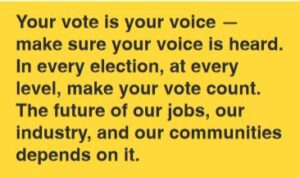Voting is a powerful tool to influence and shape our communities, workplaces, and industries. For those in the utility industry, voting is essential. The decisions we make in the voting booth impact our families, our communities and our energy future. Those who we elect influence industry regulations, funding, job security, and the future of our utilities. That’s why it’s vital for utility workers to actively engage in elections at every level, and this election is no different.

Public utility commissions (PUCs) are central to utility regulation, establishing rules on rate structures, safety standards, and environmental compliance. PUCs are often appointed by elected officials or shaped by legislative actions. When we vote, we directly influence the appointment of supportive regulators and shape policies that ensure our industry’s stability and growth.
Political changes can bring significant regulatory shifts. Leadership transitions may introduce stricter environmental regulations or push for deregulation — changes that can directly affect job security and operational practices. By participating in elections, workers can support leaders who advocate balanced policies that protect jobs while promoting sustainability and innovation.
Federal and state funding decisions, like those in the Inflation Reduction Act (IRA), are vital for maintaining and upgrading our infrastructure. Several UWUA employers received funding through the IRA. Voting ensures that our industry receives the support it needs to meet growing demands. By electing officials who prioritize infrastructure investments, utility workers can influence job creation, safety improvements, and service reliability.
Local elections have immediate effects on our industry. Decisions like gas bans or new energy project approvals are frequently made at the municipal or county level, impacting service availability, costs, and employment. By voting in local elections, utility workers ensure their concerns are considered in these crucial decisions.
State governments play a significant role in shaping the utility landscape through policies on renewable energy mandates, carbon reduction goals, and water usage — creating both opportunities and challenges. Additionally, state policies affect workers’ ability to organize and the effectiveness of unions.
For instance, right-to-work laws weaken collective bargaining power. In Michigan, utility workers helped elect a pro-union governor and state legislature in 2022, leading to the repeal of the right-to-work law that was jammed through in 2012. These same leaders are now working with the U.S. Department of Energy to reopen the Palisades Nuclear Plant — a decision that could bring back hundreds of good-paying jobs for UWUA members. Voting in state elections allows utility workers to influence policies that impact our jobs and industry.
At the federal level, policies on energy independence, the environment, and climate change mitigation can reshape our industry. Federal initiatives like the Clean Power Plan and greenhouse gas regulations have far-reaching implications. The judicial system, including Supreme Court decisions, can also dramatically impact our industry and labor rights. Decisions like Janus v. AFSCME have upended decades of legal precedent, affecting union strength across sectors. By voting in federal elections, utility workers help elect policymakers who understand the industry’s complexities and support balanced energy and labor policies.
Federal appointments to bodies like the National Labor Relations Board have lasting effects on our union’s ability to represent and organize members. Appointments to the Department of Labor impacting safety protocols can mean the difference between life and death on the job.
It’s easy to think your vote doesn’t matter. But that’s not true. Active participation can lead to significant victories. For example, in Massachusetts, labor only recently gained an official seat at the table with the appointment of the state’s first Labor Advisory Council by the governor. This council will shape policies affecting workers and communities, highlighting the impact of voter engagement.
Your union works hard every day on your behalf to engage at every level of the political process. We do that with the help of UWUA’s governmental affairs director who makes sure your voice is heard by meeting with lawmakers and politicians that are running for office to make sure they know what the UWUA’s priorities are across the country. Additionally, UWUA puts the union’s Committee on Political Education (COPE) fund to work for you whenever and wherever possible (Check out page 10 for this issue’s article on COPE).
In sum, utility workers have a vested interest in every election. By casting our votes, we shape the regulatory, legislative, and judicial environments that support our jobs and families, foster industry stability, and promote sustainability. Our participation in the electoral process ensures that our voices are heard and our priorities are addressed.
Your vote is your voice — make sure your voice is heard. In every election, at every level, make your vote count. The future of our jobs, our industry, and our communities depends on it.

